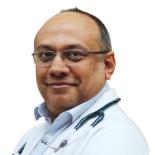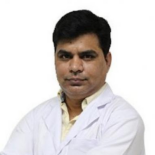
The bone marrow is a spongy tissue inside bones where blood cells are produced, including red blood cells, white blood cells, and platelets. It is a crucial component of the body's hematopoietic (blood-forming) system as it is responsible for production and sustenance of essential blood cells. Apart from acting as a producer for blood cells and a stem cell reservoir, it also plays a vital role in supporting the immune system, making it essential for overall health and survival.
A bone marrow transplant, also known as a hematopoietic stem cell transplant, is a medical procedure used to replace damaged or destroyed bone marrow with healthy bone marrow stem cells.
Fortis Institute of Blood Disorders consisting of a multidisciplined team of haematologists equipped with the latest technology at their disposal, makes Fortis Memorial Research Institute one of the best healthcare centres in South Asia for carrying out Bone Marrow Transplants and other services relevant to blood disorders.
Our Services
At Fortis Memorial Research Institute, we believe in entailing the finest medical skills combined with compassionate patient care. Our services in Bone Marrow Transplant include:
- Autologous Transplant
- Allogeneic Transplant
- Haploidentical Transplant
- Umbilical Cord Blood Transplant
These procedures are used to treat the following diseases:
- Acute and Chronic Leukaemia
- Hodgkin and non-Hodgkin Lymphomas
- Multiple myeloma
- Severe aplastic anaemia
- Genetic disorders (e.g., sickle cell anaemia, thalassemia, etc.)
Why Choose Us
-
Multidisciplined team equipped with state-of-the-art technology
-
Specialised haemato-oncology department
-
Specialised Paediatric department for BMT in children
-
One of the few centres performing matched unrelated donor transplant for thalassemia
-
Successfully completed over 2000 BMT procedures
-
One of the largest centres for multiple sclerosis, sickle cell and aplastic anaemia treatment
-
Global standard of infection control practices
More info: BMT
- Benefits
- Procedures
-

- Treatment of Blood Cancer
- Treatment of other Blood Disorders
- Immune System Reconstitution
- Support for other treatments
-

Pre-Transplant Evaluation and Preparation
-

Stem Cell Collection
-

Conditioning Regimen
-

Transplantation
-

Engraftment and Recovery
-

Post-Transplant Care
Our Team of Experts

FAQs
-
Who needs a bone marrow transplant?Patients with conditions such as leukemia, lymphoma, multiple myeloma, severe aplastic anemia, sickle cell anemia, thalassemia, and certain inherited immune system or metabolic disorders may need a BMT.
-
How are stem cells collected for the transplant?Stem cells can be collected from:Bone Marrow: Harvested directly from the bone marrow, usually from the hip bone, under anesthesia. Peripheral Blood: Collected from the bloodstream after the donor receives medication to increase stem cell production. Umbilical Cord Blood: Collected from the umbilical cord and placenta after childbirth
-
How long does it take to recover from a bone marrow transplant?Recovery time varies, but it generally takes several months to a year for the immune system to fully recover. Patients may spend several weeks in the hospital and require close monitoring and follow-up care for an extended period.
-
What is engraftment, and how is it monitored?Engraftment is the process by which the transplanted stem cells begin to grow and produce new blood cells in the bone marrow. It is monitored through regular blood tests, which measure the levels of white blood cells, red blood cells, and platelets.
-
How do patients find a bone marrow donor?Patients can find donors through: Family Members: Siblings or relatives who may be a match. Donor Registries: National and international bone marrow donor registries, such as the National Marrow Donor Program (Be The Match). Cord Blood Banks: For patients eligible for cord blood transplants.
-
What can patients expect during the hospital stay for a bone marrow transplant?Patients will undergo conditioning therapy (chemotherapy and/or radiation), receive the stem cell infusion, and stay in a specialized transplant unit to minimize infection risk. They will receive supportive care, including medications, blood transfusions, and nutritional support, and be closely monitored for complications.








